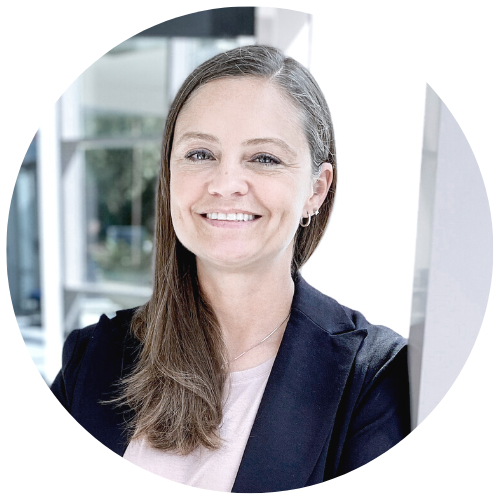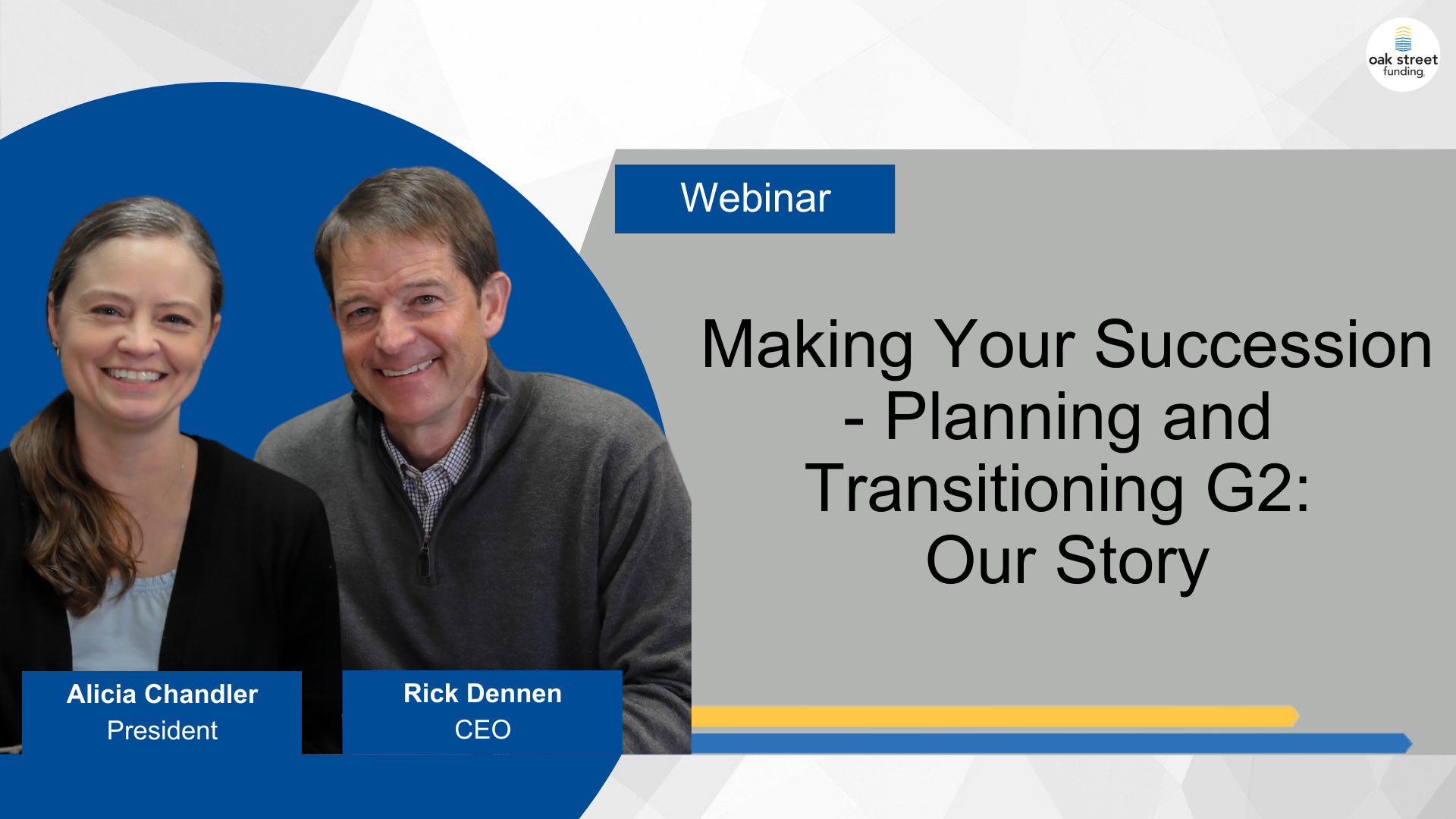Making Your Succession - Planning and Transitioning G2: Our Story
- 0.5
- 1
- 1.25
- 1.5
- 1.75
- 2
Bridget Haight: Hello everyone, and thank you for joining us today. I'm Bridget Haight, host and moderator for Oak Street Funding webinars and podcasts. I am pleased to welcome Oak Street Funding founder and CEO Rick Dennen and Oak Street Funding President, Alicia Chandler, to this webinar. In 2003, Rick founded Oak Street Funding because he saw a need for cash flow based lending in the insurance industry. The company has experienced exponential growth and was acquired by First Financial Bank in 2015. In 2021, Rick, assumed the position of Chief Corporate Banking Officer at First Financial Bank, which created an opportunity for someone to fill the role of President at Oak Street funding. Alicia Chandler, was promoted from Chief Legal Counsel to President of Oak Street Funding in July of 2022. The transition allows Rick to focus on the strategic outlook of Oak Street Funding, while Alicia focuses on day-to-day operations. So today Rick and Alicia, will share succession and transition insights from their own experiences with helpful tips for our audience. So welcome Rick and Alicia.
Rick Dennen: Thank you.
Alicia Chandler: Thank you.
Bridget Haight: Thank you for being here. We'll just jump right in. So in succession planning, the departing owner or retiring leader is often referred to as Gen 1. So Rick, you are Gen 1 as you've passed on leadership to Alicia. So there's lots of business owners out there who are looking to find excellent candidates for Gen 2. Can you just take us through what kind of... sorry, characteristics you're looking for in a Gen 2, and what made you decide to start the search?
Rick Dennen: Well. One; departing is an interesting word. That really wasn't the intent with the departing, it was more of moving on within the bank and things like that. But characteristics really aren't any different than the characteristics I was looking for as you hire people. And as I got into the banking role, we've got a wonderful management team here with passion about the business and everything. And so while the bank bought us in 2015, we continue to operate independently, management developed, and at some point in time everybody is going to move to the next thing. For me, it was a good time to provide an opportunity for the people that have been so dedicated to the business and allow the management team to step up. And Alicia, has been with us a long time, and even prior to being part of Oak Street, she was an outside lawyer for us as she was a partner with Krieg DeVault. So it really became something where, "Who really believes in the mission, vision, values of this business? Is a person going to be successful? Are they set up for success? Does the management team have confidence in that new person taking that new role?" And so, to be honest with you, it was a lot of things like that. And I think with the new opportunity at the bank, it became very obvious that Mrs. Chandler was the perfect choice.
Bridget Haight: That's great. So how about communication, about the whole transition? How did you communicate the transition was going to happen and how important is communication and transparency during a process like this?
Rick Dennen: Transparency has always been top of the house here. We've sold the business three times. Every single time we sold the business I was told, "Don't tell your team. Don't tell your team." Every single time. Everybody in the company, it's just the way we operate. You can't walk a bunch of suits through Oak Street without people going, "What's going on? We know what's going on." And then you lose credibility because you're not being transparent. So the transparency of this was a little bit hard, to be honest with you. I've got a couple of employees that have worked for me for a long time in two separate companies, even prior to starting Oak Street. So for them it was, while they have tremendous confidence in Alicia, it was still like, "Well, that's great. She's the new president. That's wonderful, but I'm still going to report to you." And I'm like, "Well, that's not the way it's going to work and it can't work that way." And so you have those discussions and everything has really worked out well because of the confidence that they have in Alicia.
Bridget Haight: That's great. So you've experienced several transitions in your career and with one of the most recent being the acquisition by First Financial Bank. So how did those experiences impact your own planning?
Rick Dennen: So like I said, three different sales. You sold in three, you sold in seven, you sold in 10, you sold in 15. And what I would say is thinking about that is every single time that occurred, and even within those time periods, we had a different board. Okay. So yeah, I've had a ton of different bosses over the last... It's 20 years now. Here it is, 2023. So to me, it's one of those things that it's just a new challenge and it almost forces you to rethink your business model, your approach, things like that. And I'm still going to be part of that going forward. But as part of the transition, once the bank bought us, I honestly didn't know what the bank was going to do with me. Even with the board of the old company that was the seller at the time, we chuckled and it's like, "I might be going in a week, I might be going..." And so it was like, "I get it. That's going to be the bank's decision." They bought 100% of the stock and here we are eight years later and you've got a new president and I'm spending some time at the bank. So I think when anybody buys a company, they're always thinking, " Well, what if? What if the CEO leaves? What if the chief council leaves? What if...?" Because then they're left with nothing, especially in a financial services company. But on the flip side as well, I was a, What if? "What if they fire me in a week? What am I going to do?" You know what I mean? So you've got all that stuff, some interesting dynamics that go on during a sale. And I would say a lot of times as we've learned lending on buying and selling and M&A transactions, it's probably the riskiest time and it's probably the riskiest thing is if management's turning over, but new buyer and seller don't see eye to eye on the future. I think, as we went through all the transitions that we had, we really welcomed the openness, we welcomed the board's involvement, we welcome challenges and we're always transparent with them. And so I think we've learned a lot over the years, and it has taught us, I think, to be more flexible, more fluid in our decision to be more thoughtful when people throw challenges to us. "Well, what if you did this?" Or, "What if you did that?" So those things are good in making you a better business person. And Alicia was right there as part of the management team, and she saw it and she was part of it. So I think part of this transition of succession, which I do think is something that works better over a period of time-
Bridget Haight: Do you feel like this transition is gone as expected?
Alicia Chandler: I think it was an interesting transition at first because we were still searching for legal counsel for a couple of months.
Bridget Haight: I remember that.
Alicia Chandler: And so now that we have that behind us and we have someone in place, it has opened up, I think, just more time and just ability for me to actually focus on the task at hand. And so it enables me to really dive into the key items in the day-to-day that I plan to.
Bridget Haight: Great. So what is the best thing that has come out of this transition so far? It's still fairly new.
Rick Dennen: I'll take a crack at that one. Similar to the last question, I was in the other role for 15 months before she took the president role on the day-to-day. And it was frankly too much, but it's part of that emotional piece where you've had people reporting to you for 15, 20 years and you're like, "Well, I don't want to upset the apple cart. I still want to be involved. I'm still running this." But then all of a sudden I started getting direct reports coming from the bank, and you just gravitated all the time back to Oak Street, which is I think where I had 13 direct reports, which is too many anyway. But now that she is in that role, I've got one person at Oak Street that provides me the information. So it's allowed me time to go to the bank and spend some more time there, and help grow that. So that's been the best. But it's also, to be honest with you, seeing the management team step up, seeing Ms. Chandler step up and be successful, I think we always go through the same process of strategy, and execution, and accountability, and those things. And she's a great champion for all that. So from July 1 to the end of the year, tremendously successful year, and I'm sure it'll continue in the future.
Bridget Haight: Yeah. What's been the most difficult part of the transition so far?
Rick Dennen: The same thing. It's like you were involved in every hire, every decision. When people are buying cameras, you were involved in it. Now you walk in, you see cameras that are all over the place-
Alicia Chandler: New pens.
Rick Dennen: New pens. It just, you're like, "Well, wait a minute, I wasn't a part of that." But then in the same breath, it's like that law of lid, if you want the company to succeed, just like you want individuals to succeed, them grow up and make their own decisions. And I think when you do that, everything will move quicker, faster. And we have really smart people. She's much smarter than I am, and so makes it easier.
Bridget Haight: So would you do anything differently? Has it all gone pretty much according to plan or is there anything you would've changed?
Rick Dennen: I wouldn't change it.
Bridget Haight: All right.
Rick Dennen: We needed to make, like I said, that 15 month period, there were a couple of changes we needed to make at management. I wasn't going to hand her a mess. And so we needed to make a couple of changes to make sure that the structure and the organizational chart, so to speak, was right and it was good for her. So that took some time, but we absolutely did that and we executed on it and it's worked out really well.
Bridget Haight: Great. Okay. So this next question is interesting. I've never heard of this, the phrase, Founders Syndrome, was coined to describe founders who feel that their business is part of their identity and they struggle to prepare for the next generation of leadership. So what advice would you have to give to somebody who has, Founders Syndrome?
Rick Dennen: Because we're in the markets we are, we see a lot of M&A, a lot of transition. As I said earlier, I think a very thoughtful process of succession is important. Whether that's one year, three year, five year. And I also think in certain industries in the RIA space or the insurance space, it's somebody that wants to get out over a five- year period is fine because they can just scale back their customers and the amount of work they're doing and things like that, and it works out. So I think that Founder's Syndrome having something else... Okay, for me, I have something else. I've got this bank job now, which is a big job with a lot of things going on. So for me, it's what I told you before. "Well, wait a minute, I want a part of this." And there is some truth to that.
Bridget Haight: Sure.
Rick Dennen: You almost get offended sometimes when you're reading stuff, but then you're super proud that they're making decisions and moving on. But-
Bridget Haight: I imagine it's harder for folks that are retiring and that they don't have another job to transition to and just stopping.
Rick Dennen: Or hobbies or anything like that. And I was with our guy, the individual that I founded the business with, and he has a bunch of things going on with another business and he's out in Arizona and things like that. But we talk a lot about retirement and" Do you have something else to do and something else to keep you busy?" Because you see a lot of people that are... I've seen that Founder... where it just... I don't know what the word I'm looking for, just smothers the management team and they leave and they don't want to see the company be successful, which is crazy to me.
Bridget Haight: Oh, there's some psychology there.
Rick Dennen: Oh yeah.
Bridget Haight: Man. So it's been said that an entrepreneur's legacy is in the leaders that they create, so not the organization that they leave behind and succession planning is vital to that whole goal. So Alicia, you are an example of a Gen 2 leader with the responsibility of building on the work of Gen 1. What has this experience been like for you?
Alicia Chandler: So I could think just overall, to me, it was an honor to be considered for that position. Just having been here for a long time and seeing the company grow from where it had when I started almost 12 years ago. And I think each day brings a new challenge. So in some ways it's refreshing because I'm not focused just on the legal. I get to look at all aspects of the business whereas before I was focused on more one specific area. So it's been a lot of learning experiences.
Bridget Haight: And you have someone you can always ask questions.
Alicia Chandler: Exactly. I have someone here that I can talk to whenever I need to text, jabber, whatever and-
Bridget Haight: Great. So how do you feel the transition has impacted the organization?
Alicia Chandler: So I feel the transition was welcomed. The management team has been very supportive, just working together for as long as we had, there's that level of trust and commitment to the business and to each other. And so I felt it was very natural just being supported by the whole team.
Bridget Haight: That's great. Sounds healthy, healthy team. So we've discussed the importance of Gen 1 planning for succession on our podcast, but what have you learned in this process as Gen 2 that you'd like to share with the audience?
Alicia Chandler: So I think just don't be afraid to ask questions. Coming into this role, as I said, there's a lot of different aspects. And so there are plenty of questions that I've asked and that I still have to ask. And we have weekly updates that we're going to be going through, one later today in fact. And so I have questions and things that I just need to get his thoughts on, and I don't think that'll ever stop. So it's having someone to go to, just don't be afraid. Put yourself out there. Try to learn as much as you can. Get involved in conferences, seminars, speaking opportunities. You just got to throw yourself into it and just don't be afraid.
Bridget Haight: All right. So how do you balance introducing your new ideas while maintaining the precedents that demonstrate the success of the organization so far?
Alicia Chandler: I think our philosophy is still the same. Nothing's going to change the mission, vision, value that we've always shared, and I don't think that's going to change. And with Rick, being a part of the strategic process and the projects, I think any new ideas are really going to be just building upon what we've already done and the successes we've already had and just keep continuing to grow the business.
Bridget Haight: So what do you feel like is the key to your success in your new role so far? What are you really proud of?
Alicia Chandler: I am proud that we had a phenomenal third and fourth quarter. I think our growth was a lot more than I think we anticipated just with how the economics were at the time. And I think we've gelled more as a team. I think internally, the staff and everyone else on the management team, I feel like it's become just more of a cohesive and friendly environment back to the family feel. And everyone seems like they're having a good time while they're working hard.
Bridget Haight: So what advice would you give to others who might be looking at being a Gen 2 in the near future?
Alicia Chandler: So I think my biggest takeaway is to have that conversation with the person that you're maybe stepping in their shoes, whether they're moving onto a different position or if they're retiring, which is the case for some of our borrowers. To have that conversation about where you see the company going forward. Is your path aligned? Are your goals aligned? Do you have divergent ideas on where you see things? And I think it's just that open communication that's key in this situation.
Rick Dennen: Kind of like we talked with the different sales and you're going to get challenged. The only thing we know that's wrong is the business plan, and it's going to... From the day we put it on paper, it's going to change. And so having that flexibility, listening, asking questions, they're smart people, they'll figure it out.
Bridget Haight: Here's another question. What would you say to an entrepreneur whose just started a business and has no plans to succeed in the next few years?
Alicia Chandler: Well, I think as part of their business plan, they need to have succession in there. If they're 25 or 55, I don't think that matters. I think if you are going out and you're starting your own business, you need to obviously create that business plan. And any part of that is it should include succession. And because you're going to have to grow people and just get them in the business and mentor them along the way and so you have to start that process.
Bridget Haight: So we've focused on internal succession planning today, but are there any other options for business owners? What are the pros and the cons? Rick, I'll bring it back to you.
Rick Dennen: Obviously, you're just selling it and turning it over to a new management team. And that's something that when we sold in 2015, we had 21 offers.
Bridget Haight: That's impressive.
Rick Dennen: So it's nice. And it came down to, we had financial sponsors and we had strategic, which is where we ended up at the bank. But number one; you need options to be able to make decisions. The four banks that were left, when we got down to four, there was a huge assessment. We talked as a management team as well, "Which one are we going to fit in best with?" There's a balance of you want the highest price so that your selling group is going to be happy. But they were so wonderful to us, and I think we delivered such a good return that they were like, same thing, "Which one do you guys feel most comfortable with?" And we started focusing in on which one is the best and which one's not. And the price worked out the way it did, and everybody was really happy.
Alicia Chandler: And you mentioned what other options, there's always external succession, but I think that brings along a lot of other different challenges that they're not going to understand the business and the way that you've run it. And just, I think, the emotional aspect that comes along with it and just having that connection with the people that you've come up along the way within the business. So I don't see a lot of people doing external.
Rick Dennen: Because it's a niche industry, very few people I think could step in. And, in my opinion, when you do that, here you've groomed these wonderful, highly intelligent people and it's like, "Okay, but now we're selling and we're going to give it somebody else." That was my fear, to be quite honest with you. So if you think about it, we had an East Coast bank, we had two Midwestern banks and then a Southeast bank, and we ended up with the Midwest Bank. I would say they were probably most culturally aligned with us, the most bought in to what we wanted to achieve and what we laid out in our strategic plan. And it was the ones that were like, "Well, we're going to move your underwriting group to Alabama and your sales team will be part reporting to New York." And it's like, "Well, that model's not going to work." But again, they own it. Whoever buys it is going to own it. So they can fire everybody. So that was part of the decision process that we went through and we clearly made the right decision with going with First Financial Bank and they've been a wonderful partner for us since 2015.
Bridget Haight: Fantastic. Well, we are almost out of time, but before we close, do either of you have any last pieces of information that you would like to share?
Rick Dennen: My only thought is that it's timing. You know what I mean? I think the best successions we've seen in even this one, in a transitional, it's think about it in advance. And I think you can wrap your emotional mind around that. And you're turning it over and you're going to put the right people in place and all those types of things. It's the ones we see where, I mean, it's a divorce, it's a health issue. It's somebody who's just got some crazy price, but they're turning it over to somebody that's just going to blow the organization up, which tells you they don't care about their people and they don't care about their customers. And those that I just mentioned are the problems. This is an opportunity for the management team and Alicia, it's an opportunity for me. And I just think when you can be thoughtful with any decision, you know what I mean? If you think about it, it's just going to make it easier and better.
Bridget Haight: Makes total sense. Well, thank you so much for your time today. It's been wonderful talking to you, and I'm sure you've given lots of wonderful advice for our listeners.
Alicia Chandler: Thank you.
Rick Dennen: Thank you, Bridget.
Bridget Haight: Thank you to everyone for joining us. I hope you learned something today. We will be sharing more on this topic in the coming weeks, so stay tuned. Thanks and have a great day.
DESCRIPTION
In 2003, Rick founded Oak Street Funding because he saw a need for cash-flow based lending in the insurance industry. The company has experienced exponential
growth and was acquired by First Financial Bank in 2015. In 2021, Rick assumed the position of Chief Corporate Banking Officer at First Financial Bank, which
created an opportunity for someone to fill the role of president at Oak Street Funding. Alicia Chandler was promoted from Chief Legal Counsel to president of
Oak Street Funding in July of 2022. This transition allows Rick to focus on the strategic outlook of Oak Street Funding while Alicia focuses on day-to-day operations.
Today, Rick and Alicia will share succession and transition insights from their own experiences with helpful tips for our audience.
Today's Guests

Rick Dennen








